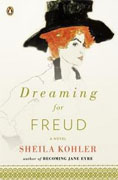Dreaming for Freud
Sheila Kohler
book reviews:
· general fiction
· chick lit/romance
· sci-fi/fantasy
· graphic novels
· nonfiction
· audio books
· author interviews
· children's books @
curledupkids.com
· DVD reviews @
curledupdvd.com
newsletter
win books
buy online
links
home
for authors
& publishers
for reviewers

 |
Dreaming for Freud Sheila Kohler Penguin Books Paperback 256 pages May 2014 |
|
Deceptively elegant and coolly passionate, Kohler’s novel about the birth of psychoanalysis begins in 1900. A young woman, a psychiatric patient named Dora (the pseudonym given by Sigmund Freud to Ida Bauer), is diagnosed with hysteria and treated by Freud for about eleven weeks. Dora’s most manifest hysterical symptom is “aphonia” or loss of voice, but she’s also wracked with aching limbs. Freud wants to break through Dora’s hysterical resistance, “this slip of a girl” who has come to him in the autumn of the first year of the century.
Elegant and suspicious Dora is hardly in the throes of demonic possession, but the extremity of her condition sets up the miracle of her cure, establishing the premise for Freud’s case study Fragments of an Analysis of a Case of Hysteria. After the initial shocking introduction, Dora’s condition subsides to a fevered simmer. Her embarrassed confessions about her father, the extremely rich Philipp, and her accusations of seduction by his friend, the enigmatic Herr Z, mark the tale’s central dramatic journey. Philipp insists his hard-won security has spoiled his daughter by giving her everything she could possibly want. Dora is undoubtedly intelligent and cultured, and she has excellent opportunity to get well even as she’s plagued by the incessant coughing which makes her lose her breath and terrifies her. Dora is determined to give the unusual man a chance. There’s a shrewd look in her dark eyes; she acknowledges that Freud has written a new book on dream interpretation even when the renowned neurologist strikes her as a typical Jewish petit bourgeois (“perhaps a shopkeeper or even a dressed-up peddler”). Switching between Dora and Freud’s inner thoughts, Kohler accelerates the palpable sense of the pleasure Freud derives from his experiments with words and dream analysis. From Philipp’s quiet and complicit bargain with Herr Z to Dora, who was perhaps used as a “pawn in their dirty game,” to Philipp’s growing impatience with this slow cure, Kohler explores the notion of how talking can make the pain go away. Will this arrangement encourage Dora to speak out or make her more afraid? Is there something in this beautiful, anguished young woman that frightens or seduces her would-be rescuer so he can’t show her his face? These strands are gently pulled together by Kohler in her tale of repression and release and the struggle for power in the early twentieth century. The novel flashes on the brilliant, bourgeois Viennese La Belle Époque world in which the tale’s various sections mirror Dora’s two important dreams. Freud, meanwhile, writes in a fever pitch, putting aside his beloved ancient statuettes and artifacts to demonstrate how dream interpretation elucidates entire analysis, pointing the way through the formidable resistance of hysterics. This therapeutic world is an arena of power play, where helpless Dora is revealed as the most insightful and searching person ever while her doctor makes it well known that he will use her deepest and darkest sexual secrets for his own means. Although Kohler’s book might sound like a treatise on analysis, in reality her story is one of competing affections: a kind of father/daughter relationship competing with an invasive, brutal male triangle where the patient sometimes sees these three men as evil exploiters shrouded in their foul-smelling cigar smoke. Dora’s fears and suspicions are tainted by a tormented adolescence, and Freud draws his own conclusions, based on what he observes and hears from Dora (and perhaps from her father). The novel is intimate, private, and sometimes deeply sexual in its exploration of the nature of reality, memory, and identity. A suave chamber piece and a dream story, the novel offers a glimpse into one of twentieth century’s intellectual titans and also a remarkable woman whose history, previously swallowed up, has been brought back into the light. Originally published on Curled Up With A Good Book at www.curledup.com. © Michael Leonard, 2014 |
| Also by Sheila Kohler: |
|
|
|
 Click here to learn more about this month's sponsor! |
|
| fiction · sf/f · comic books · nonfiction · audio newsletter · free book contest · buy books online review index · links · · authors & publishers reviewers |
|
| site by ELBO Computing Resources, Inc. | |
 In his forty-fourth year, Freud dreams of finding gold in the heart of Dora’s story. He also has an agenda: seeking revenge on his enemies, his hypocritical Viennese colleagues who have snubbed him and his notorious dream book, this “fragment of an analysis.” Freud has been passed over again and again for the professorship that would bring prestige and above all financial security to his family. Hopefully the broken pieces of Dora’s life will finally bring him the fame he so covets. All he desires is renown, which will surely come from finding the origins of these “illnesses of the mind.”
In his forty-fourth year, Freud dreams of finding gold in the heart of Dora’s story. He also has an agenda: seeking revenge on his enemies, his hypocritical Viennese colleagues who have snubbed him and his notorious dream book, this “fragment of an analysis.” Freud has been passed over again and again for the professorship that would bring prestige and above all financial security to his family. Hopefully the broken pieces of Dora’s life will finally bring him the fame he so covets. All he desires is renown, which will surely come from finding the origins of these “illnesses of the mind.”